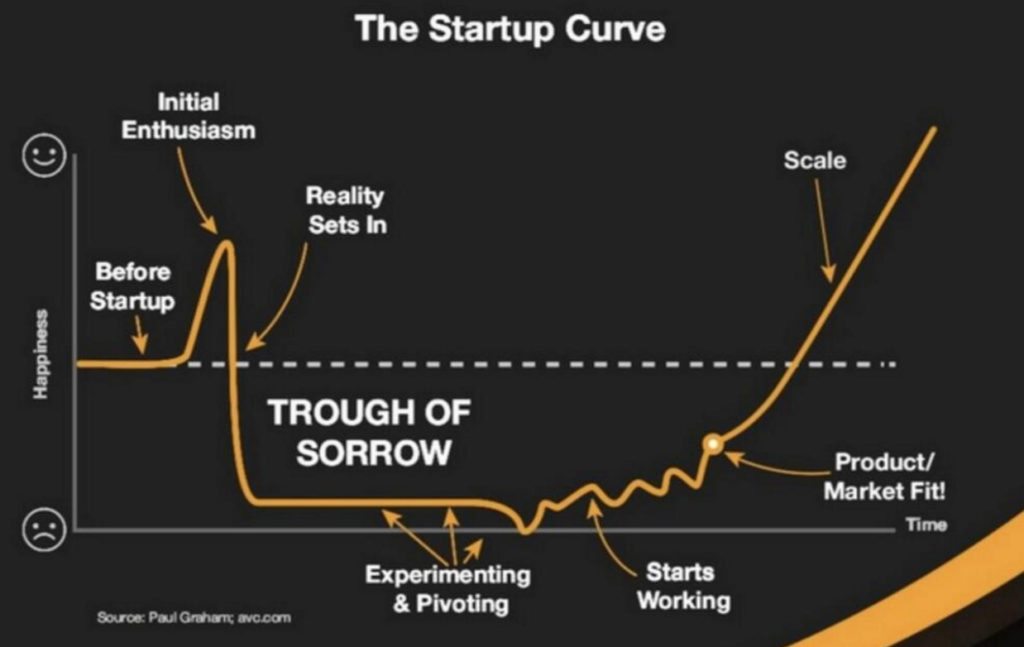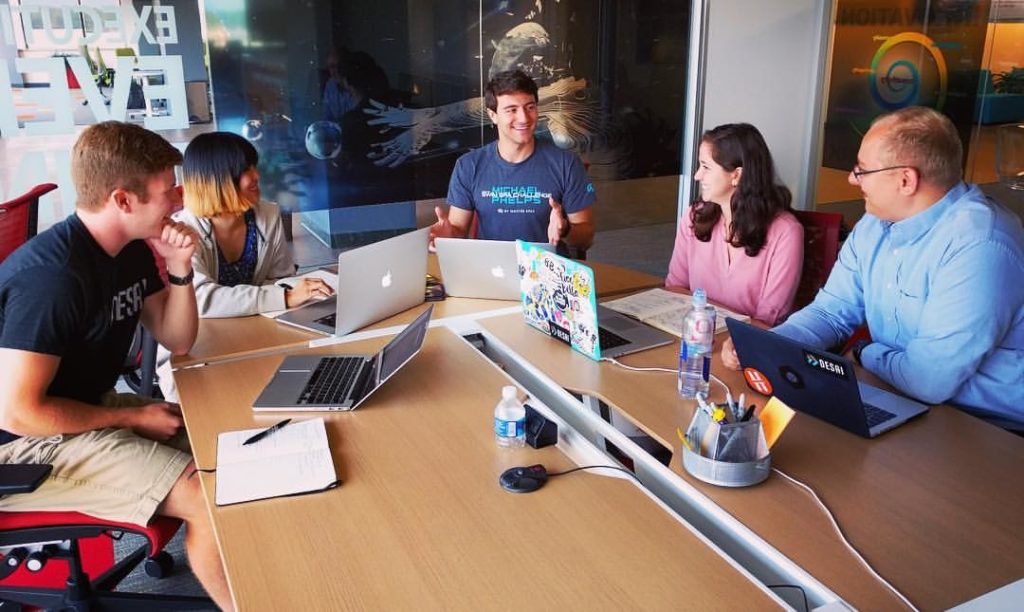Reality Check: What It's Really Like To Be An Entrepreneur
Requests: 0
Views: 9
A lot of people hold the misconception that building a technology startup is a glorious endeavor. For most wide-eyed first-time founders, the reality sets in very quickly.
"Startup life" is evangelized by the media to highlight events like closing large fundraising rounds, securing industry partnerships and being featured on TechCrunch. Truly successful founders know that these superficial events don't hold significant value in growing a real business. The "Silicon Valley" fame associated to these sitcom storylines is not reality.
 Real startup life is filled with the highest of highs and the lowest lows. It's the peaks and valley's of building a startup that made me compelled to share the realities of being an entrepreneur. First, a disclaimer: I wouldn't trade my current situation for any other option, and I'm grateful to be able to do what I truly love. However, being an entrepreneur isn't easy, here's a few reasons why:
Real startup life is filled with the highest of highs and the lowest lows. It's the peaks and valley's of building a startup that made me compelled to share the realities of being an entrepreneur. First, a disclaimer: I wouldn't trade my current situation for any other option, and I'm grateful to be able to do what I truly love. However, being an entrepreneur isn't easy, here's a few reasons why:
 On top of that, the travel can be overwhelming. Some people think that a travel-filled schedule is glamorous...it's not. The airports, delays, cancelations, time zone changes, lack of sleep, paired with missing family and friends events gets old fast. As a CEO, by enlarge, you deal with all that bull sh*t alone!
On top of that, the travel can be overwhelming. Some people think that a travel-filled schedule is glamorous...it's not. The airports, delays, cancelations, time zone changes, lack of sleep, paired with missing family and friends events gets old fast. As a CEO, by enlarge, you deal with all that bull sh*t alone!
 You feel pressure...immense pressure. From everyone. Family, friends, employees, advisors, customers, competitors. But, most of all, yourself. Everyone is excited for you, and you don’t want to let people down. When things don't go as fast as you'd like them to, the pressure only builds...
You feel pressure...immense pressure. From everyone. Family, friends, employees, advisors, customers, competitors. But, most of all, yourself. Everyone is excited for you, and you don’t want to let people down. When things don't go as fast as you'd like them to, the pressure only builds...
 Every founder experiences these triumphs and tribulations at some point. Entrepreneurship is not the carefree career path that many believe it to be; it's actually quite the opposite. Anything but the utmost conviction in what you’re doing, and the stability that comes with that conviction, makes it extremely difficult to get back up when you stumble.
See Also: 6 Reasons You Should Not Start A Startup
Every founder experiences these triumphs and tribulations at some point. Entrepreneurship is not the carefree career path that many believe it to be; it's actually quite the opposite. Anything but the utmost conviction in what you’re doing, and the stability that comes with that conviction, makes it extremely difficult to get back up when you stumble.
See Also: 6 Reasons You Should Not Start A Startup
 Founding your own company is an unbelievably rewarding experience. You’re shaping your own destiny and, in the case of software, you're creating value for millions (hopefully!) of people around the world. Along the way, you rely on your co-founders, for support, commiseration and understanding.
Many entrepreneurs are driven by the need to build something great and help other people. No one sees the sweat, aggression and tenacity needed to turn those dreams into reality. You have to love what you're doing.
That's what keeps me hungry, how about you?
Founding your own company is an unbelievably rewarding experience. You’re shaping your own destiny and, in the case of software, you're creating value for millions (hopefully!) of people around the world. Along the way, you rely on your co-founders, for support, commiseration and understanding.
Many entrepreneurs are driven by the need to build something great and help other people. No one sees the sweat, aggression and tenacity needed to turn those dreams into reality. You have to love what you're doing.
That's what keeps me hungry, how about you?

 Real startup life is filled with the highest of highs and the lowest lows. It's the peaks and valley's of building a startup that made me compelled to share the realities of being an entrepreneur. First, a disclaimer: I wouldn't trade my current situation for any other option, and I'm grateful to be able to do what I truly love. However, being an entrepreneur isn't easy, here's a few reasons why:
Real startup life is filled with the highest of highs and the lowest lows. It's the peaks and valley's of building a startup that made me compelled to share the realities of being an entrepreneur. First, a disclaimer: I wouldn't trade my current situation for any other option, and I'm grateful to be able to do what I truly love. However, being an entrepreneur isn't easy, here's a few reasons why:
1) Mental Fatigue
It is almost impossible to get your mind off of your startup, even if you want to relax you cannot. The all-consuming thought of success or failure will always dwindle in the back of your mind. Success could mean anything and everything about your business. As a founder, you're faced with the challenge of building a mental model of a future no one else can see but you.“An entrepreneur is someone who jumps off a cliff and builds a plane on the way down!" - Reid Hoffman
2) Loneliness
Most days, you don’t have anyone to talk to about the challenges you are experiencing. Family and friends don’t quite understand, and the problems you're facing are unique to each founding team's business. You become a Nighthawk. On top of that, the travel can be overwhelming. Some people think that a travel-filled schedule is glamorous...it's not. The airports, delays, cancelations, time zone changes, lack of sleep, paired with missing family and friends events gets old fast. As a CEO, by enlarge, you deal with all that bull sh*t alone!
On top of that, the travel can be overwhelming. Some people think that a travel-filled schedule is glamorous...it's not. The airports, delays, cancelations, time zone changes, lack of sleep, paired with missing family and friends events gets old fast. As a CEO, by enlarge, you deal with all that bull sh*t alone!
3) You get to deal with all the crap!
Speaking of bull sh*t, all of the company’s ‘crap’ finds you. As a Founder, you’ll be the first to know about the good, bad, and ugly in your company. There's a little bit of crap in every part of the business (marketing, development, partners, finance, etc.). No one else realizes the scope of this because they don’t have visibility into everything like the founding team does. Usually, no one sees or hears about any of this before you fix all of the chaos. You shoulder it, resolve it, then move on.4) Pressure
People always say that a business owner is the "boss". This couldn't be further from the truth. As a founder, you’re everybody’s employee. It’s the fullest full-time job there is, 7 days a week, 365 days a year, and even taking the time to jot down some notes on it feels like time stolen from doing actual work. In a startup, you're constantly dealing with the stress associated with growing the business. You feel pressure...immense pressure. From everyone. Family, friends, employees, advisors, customers, competitors. But, most of all, yourself. Everyone is excited for you, and you don’t want to let people down. When things don't go as fast as you'd like them to, the pressure only builds...
You feel pressure...immense pressure. From everyone. Family, friends, employees, advisors, customers, competitors. But, most of all, yourself. Everyone is excited for you, and you don’t want to let people down. When things don't go as fast as you'd like them to, the pressure only builds...
5) Risk
Most founders fail at building a successful self-sustained business. There is no recipe for success, no checklist for viral growth. You're on your own, and the risk is real. You have little or no money, take on side-jobs to live, but you're on a mission. You're constantly trying to minimize risk. You're always on the edge thinking about how to keep the ship afloat. Every founder experiences these triumphs and tribulations at some point. Entrepreneurship is not the carefree career path that many believe it to be; it's actually quite the opposite. Anything but the utmost conviction in what you’re doing, and the stability that comes with that conviction, makes it extremely difficult to get back up when you stumble.
See Also: 6 Reasons You Should Not Start A Startup
Every founder experiences these triumphs and tribulations at some point. Entrepreneurship is not the carefree career path that many believe it to be; it's actually quite the opposite. Anything but the utmost conviction in what you’re doing, and the stability that comes with that conviction, makes it extremely difficult to get back up when you stumble.
See Also: 6 Reasons You Should Not Start A Startup
But it’s not all doom and gloom!
 Founding your own company is an unbelievably rewarding experience. You’re shaping your own destiny and, in the case of software, you're creating value for millions (hopefully!) of people around the world. Along the way, you rely on your co-founders, for support, commiseration and understanding.
Many entrepreneurs are driven by the need to build something great and help other people. No one sees the sweat, aggression and tenacity needed to turn those dreams into reality. You have to love what you're doing.
That's what keeps me hungry, how about you?
Founding your own company is an unbelievably rewarding experience. You’re shaping your own destiny and, in the case of software, you're creating value for millions (hopefully!) of people around the world. Along the way, you rely on your co-founders, for support, commiseration and understanding.
Many entrepreneurs are driven by the need to build something great and help other people. No one sees the sweat, aggression and tenacity needed to turn those dreams into reality. You have to love what you're doing.
That's what keeps me hungry, how about you?

Reactions